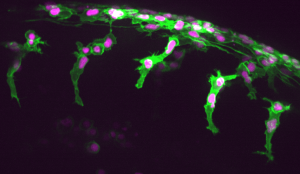Postdoctoral position in Zebrafish mechanobiology in Cambridge
Posted by Elena Scarpa, on 18 November 2022
Job type: Postdoc
Location: Cambridge
Closing Date: 8 January 2023
We are pleased to advertise a Postdoctoral Research Associate position in Dr Elena Scarpa’s group to investigate the role of tissue-scale mechanical stress during in vivo cell migration and cell division.
In vivo, cells migrate through tight spaces and may undergo division in crowded environments, both in physiological and pathological contexts, for example during immune cells diapedesis or cancer cell dissemination. These phenomena are difficult to observe in vivo, especially in mammalian models. Key studies in the field have largely exploited in vitro systems, for example culturing cells in 3D collagen matrices or microfabrication of PDMS microchannels, to mimic interstitial confining environments. From this wealth of work, it has become clear that cells experiencing physical confinement during cell migration suffer mechanical stress. This causes deformation of the largest organelle, the nucleus, and loss of nuclear integrity, thus inducing DNA damage. Physical compression can even promote genetic diversity in cancer cells. In addition, when cells in culture undergo mitosis under mechanical compression, they show extensive cortical blebbing and suffer division defects. Together, these findings show that mechanical stress negatively impacts the integrity of the genome and this has been proposed to underlie cancer initiation and progression. However, the consequences of mechanical compression on cells during in vivo cell migration remain so far unexplored.
Our lab uses Zebrafish trunk neural crest cell migration as a novel, physiological model to understand whether physical confinement threatens the integrity of the genome in vivo, and whether this can promote cancer initiation.
The post-holder will carry out in vivo laser and embryological manipulations, live imaging, and quantitative image analysis. For example, they will be involved in designing and establishing tissue-scale methods to alter in vivo mechanical compression. Besides these tasks, the PDRA may train and supervise students recruited to carry out complementary aspects of the lab’s research. In addition, they will meet and discuss the work with collaborators, present at conferences and contribute to write articles describing the outputs of the research.
Candidates should have a PhD in a relevant subject. The multidisciplinary nature of the post requires previous experience in the Zebrafish animal model, live imaging and quantitative image analysis. The ability to plan, execute and record scientific studies; make independent decisions and solve routine problems encountered in research projects is essential, as are excellent verbal and written communication skills.
This position is available from 1 March 2023 for 12 months in the first instance. We welcome applications from individuals who wish to be considered for part-time working or other flexible working arrangements.
Please get in touch at es697@cam.ac.uk should you have any further questions about this post.

Salary: £34,308-£42,155
Start date: 1 March 2023
Closing Date: 8 January 2023
Scientific fields: Cell biology, Morphogenesis, Development and disease
Model systems: Zebrafish
Duration: Fixed term
Minimum qualifications: PhD

